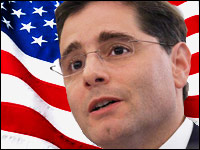
Lines are being drawn in the fight over control of wireless spectrum space.
On one side is the wireless industry, which is “facing a looming spectrum crunch,” said Federal Communications Commission Chairman Julius Genachowski.
“Without sufficient spectrum, we will starve mobile broadband of the nourishment it needs to thrive as a platform for innovation,” Genachowski told broadband executives gathered Wednesday at an event hosted by the New America Foundation.
On the other side is the broadcast industry, which is being asked by the top communications regulator to give up some of its coveted spectrum as part of a goal to free up 500 megahertz of space for the wireless industry in the next decade.
National Broadband Plan
The FCC, charged with developing a strategy to bring high-speed Internet to all Americans as part of President Barack Obama’s American Recovery and Reinvestment Act, plans to deliver its National Broadband Plan to Congress next month.
As part of the plan, the FCC chairman outlined what he called the “Mobile Future Auction” designed as a way to auction existing spectrum licenses, allowing TV broadcasters to voluntary relinquish spectrum in exchange for some of the proceeds.
Up to US$50 billion in value could be unlocked if the broadband plan is adopted to convert some of the broadcast spectrum to mobile broadband, Genachowski said.
Wireless Industry Needs It
The wireless industry quickly backed the proposal. The plan is essential to the wireless industry’s ability to provide Americans access to broadband anywhere, said Steve Largen, president and chief executive of CTIA – The Wireless Association.
Broadcasters are underutilizing their allotted spectrum space, Largen told the E-Commerce Times, citing numbers presented by the FCC chairman.
In markets with less than one million people, only 36 megahertz are typically used for broadcasting, he noted. In cities with more than one million people, about 100 megahertz are used. Even in the largest cities, at most only about 150 to 300 megahertz are used by broadcasters.
“We need to make more effective use of broadcast spectrum, and we need to find a way to put a significant amount of this spectrum to use for mobile broadband,” said Largen. “Until the spectrum is allocated, we will contine to talk about this issue.”
Broadcasting Is Already Efficient
The broadcast industry is not convinced. “We think it is a false choice,” said Dennis Wharton, executive vice president of the National Association of Broadcasters, referring to the plan to allocate more broadcast spectrum to the wireless industry.
While mobile phone networks provide only one-to-one transmission, broadcast stations provide one-to-thousands.
“When you are talking about delivery of timely information to many people at once, there are no better alternatives,” Wharton told the E-Commerce Times, adding that in times of crisis, mobile phone networks often crash.
“We will be making that argument aggressively to lawmakers,” he said.
Just the Beginning
The part of the proposal unveiled by the FCC chairman concerning spectrum is just the beginning of the fight between the wireless and broadcasting industries in the coming months, said Ben Lennett, policy analyst at the New America Foundation.
“Broadcasters are not inclined to give up their free spectrum,” Lennett told the E-Commerce Times.
There are already concerns about the profit broadcasters would make off an auction for something the industry never paid for in the first place. “Over time, they have made billions on this free spectrum,” he pointed out.
Other options to free up spectrum space are on the table, he added. One way might be for the government to relinquish some spectrum when it is not in use.






















































Social Media
See all Social Media